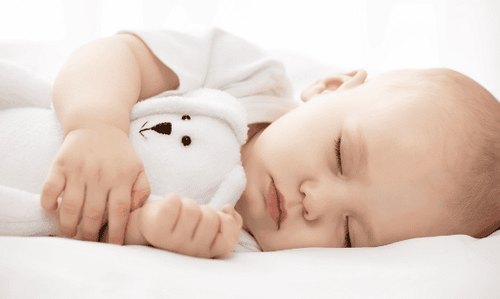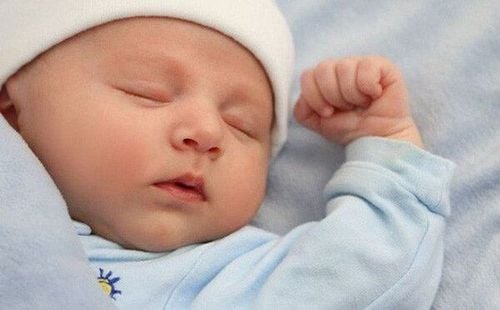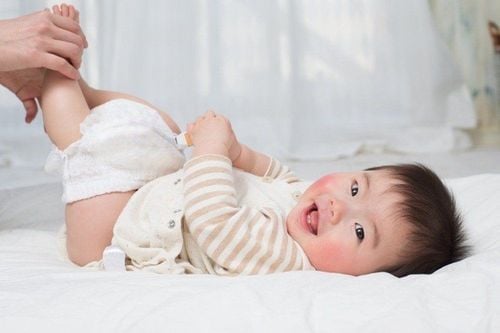This is an automatically translated article.
Newborn snoring, sweating... can be normal manifestations. However, sometimes these behaviors are warning signs of a child's health problem. Therefore, if the child has the following problems, parents should not be subjective, observe the child carefully to avoid unexpected situations.1. Irregular breathing
As your baby sleeps, you may notice a change in his breathing. Your baby may breathe fast at first, then slower, then pause for 5-10 seconds and resume rapid breathing, and so on. Doctors call this "intermittent breathing" - a common phenomenon in babies around 6 months old.1.1 Causes In general, most cases of irregular breathing in children are not cause for concern. Some babies have sleep apnea, which stops breathing for up to 20 seconds. This interruption is normal, possibly because the area of the brain responsible for regulating breathing is still immature. However, if the pause in breathing lasts longer than 20 seconds, the baby should be taken to a specialist for examination and evaluation.
Babies' hands and feet also turn bluish when they're crying, coughing, or feeling a little cold. This is quite normal, but if your baby's forehead, tongue, fingernails, lips or torso are often pale, it could be a sign that the baby has been deprived of oxygen.
1.2 Solution Putting your baby to sleep on his back will help him breathe. If your baby stops breathing, touch or nudge him gently to see if he reacts. If there is no response, you need to find a way to help your baby immediately.
In case the baby stops breathing and cannot be woken up, start performing CPR immediately, and ask a loved one to call 911 for help. If you are alone, call 911 yourself after 2 minutes of CPR on your baby and then continue CPR until paramedics appear or the baby starts breathing again.

Nhìn chung thì hầu hết các trường hợp nhịp thở không đều của trẻ không đáng lo ngại
2. Sleeping babies snore and snort
Many babies snore when their noses are blocked, which is common in the first few weeks of life. If your baby snores or snorts from time to time, it shouldn't be a cause for concern. However, constant snoring can be a sign of a health problem.Solution If your baby has a cold, try using a steam generator or humidifier to make breathing easier. Besides, the American Academy of Pediatrics recommends that you talk about your child's snoring with the doctor. Your doctor may check for specialist problems, such as ENT or sleep disorders, to see if testing or treatment is needed.
3. Children sweat while sleeping
Some babies sweat profusely during the deepest stages of their nightly sleep cycle, ending up drenched in sweat when they wake up. Because infants spend more time in the deepest stages of sleep, they are more prone to night sweats than adults and older children.Sweating is a very common phenomenon, but excessive sweating can signal an issue. For example, excessive sweating - especially when eating, can be a sign of congenital heart disease, as well as infections and sleep apnea. Sleeping in a room that is too hot is also a risk factor for sudden infant death syndrome (SIDS).
Solution Your child's bedroom should be warm but not too hot. Set the room temperature to a level where you are comfortable wearing light clothing. Dress your baby in just enough clothing to sleep comfortably without a blanket. Do not tie or wrap your baby and remove all blankets from the crib.
As a general rule, when adults feel too hot, so do children. If it's cool in the house and your baby is dressed in light clothes but is still sweating, take her to the doctor for a checkup.

Một số trẻ đổ mồ hôi nhiều trong giai đoạn sâu nhất của chu kỳ ngủ hàng đêm, cuối cùng là ướt đẫm người khi thức dậy
4. Children grind their teeth
More than half of children grind their teeth, especially while sleeping. Teeth grinding can happen at any age, but is most common in infants, when the first teeth come in (usually around 6 months). Although this sound can affect the nerves, grinding teeth does not harm your baby's teeth.Reasons for a child to grind their teeth may include:
New teething sensation Ear pain or pain for teething Breathing problems, such as a stuffy nose. What to do Ask the dentist during your child's first dental visit at 1 year of age. Doctors and dentists can evaluate the cause behind the grinding and check for damage to the enamel. Very few babies can grind their teeth so violently that they wear down their teeth.
If the child has abnormal behavior while sleeping for a long time, parents should not subjectively need to take the child to a reputable medical facility for examination to rule out unwanted health problems.
In addition, in order to prevent diseases that young children often get, parents should pay attention to nutrition to improve children's resistance. At the same time, add supporting foods containing lysine, essential micro-minerals and vitamins such as zinc, chromium, selenium, B vitamins,... snacks and less digestive problems.
Parents can learn more:
Why do you need to supplement Lysine for your baby?
The role of zinc - Guidelines for reasonable zinc supplementation
Please visit the website Vinmec.com regularly and update useful information to take care of your baby and family.
Reference source: babycenter.com













